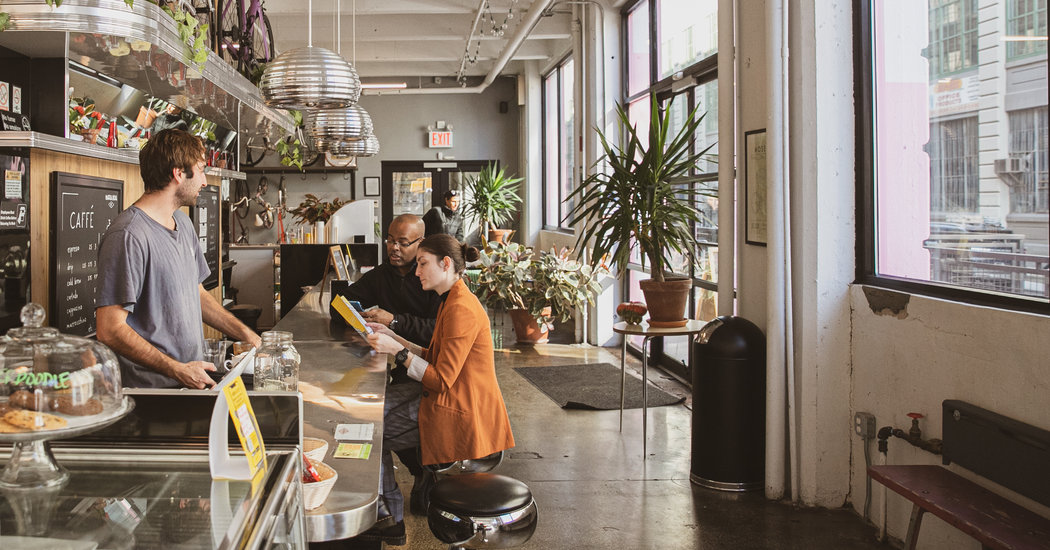
The joke used to be that there’s a Starbucks on every corner in New York City. Now there’s coffee in the corner of almost every store.
At Lichen, a boutique in Williamsburg that sells home goods and furniture, you can pick up Danish glass cups for $7, an Italiana Luce lamp for $85 or a marble chair for $12,000. But like more and more stores of all types — plant shops, bike shops, barber shops — there’s also a coffee bar tucked into the side.
“If you walk in somewhere and there’s expensive furniture, and there’s no music playing, it turns into a gallery,” said Jared Blake, who owns Lichen with Edward Be. “But if it’s people drinking coffee and there’s music playing, you’re like: ‘Oh, I can lean into this a little bit, feel it and want to buy it.’” He estimates that coffee accounts for between 15 and 20 percent of the store’s sales.
At Regular Visitors, a coffee counter takes center stage between the shelved walls of fragrance oils, magazines and candles, but don’t call it a coffee shop. Daniel Sorg, a founder of the Boerum Hill store — which self-designates as a local meeting place — said they had initially pictured it as a modernized newsstand, both a community hub and a sundry stop.
“We originally set out to do retail — specifically I wanted to curate products and beautiful things, essential stuff,” Mr. Sorg said. “Then the newsstand became a bigger idea and it was like, ‘We have to have coffee, we’re on the corner, we’re above a subway, we’re in New York.’”
For some stores, it’s a simple way to add foot traffic. “How can you have as many points of entry as possible?” Mr. Sorg said. “If you’re relying on any one thing, any one revenue stream, any one idea, eventually it’s probably going to change or dry up. We wanted to give a bunch of different people different reasons to come in every day.” And so, coffee.
The owners of Lichen and Regular Visitors all entered the coffee world with minimal knowledge, and turned to local roasters for their education. Mr. Sorg learned proper brewing techniques from Nobletree’s Brooklyn roasting facility; Lichen’s owners worked at first with one particular roaster — that is, until David You, a singer-songwriter and DJ, walked in one day, tasted their product and quickly educated the pair on how to improve their blends, using his own connections to roasting companies. He’s stuck around as a regular and informal advisor ever since.
Other spots, like Maglia Rosa, have paired with larger-name roasters. While its Carroll Gardens store is a bike shop only — designed for professional cyclists with a penchant for Italian-imported rides — the Industry City location emphasizes coffee and food. Aside from bicycle-influenced decor, books and apparel, the store features a bicycle self-service station and bike parts vending machine.
Owner Manuel Mainardi, a racer himself, was offered the opportunity to open a store in Industry City — a particularly convenient spot, considering the current construction of a 4th Avenue bicycle lane that will stretch from Atlantic Avenue in Boerum Hill to Bay Ridge.
He joked that his first thought, a combination booze-and-bicycle shop, would not have been the best in practice; his second thought was to bring coffee on board. Mr. Mainardi lived most of his life in Italy, and wanted to recreate the coffee he drank there, so he worked with La Colombe Coffee Roasters to achieve that flavor.
La Colombe works not just on blend with its clients — initial tastings may include up to 30 varieties — but also functional coffee bar design, according to Nicolas O’Connell, La Colombe’s senior vice president of sales and wholesales.
Mr. O’Connell added that “hybrid concepts are becoming more and more popular,” and credited Saturdays NYC — a surf shop-cum-coffee bar — with spearheading the trend. When Saturdays NYC opened their Soho location, they paired with La Colombe and developed a signature roast that is only sold at their New York locations, according to Morgan Collett, a founder.
However, the coffee-store combination isn’t limited to small businesses. Ralph Lauren has cafes in their Upper East Side and Rockefeller Plaza locations, and Brooks Brothers has one in their Red Fleece-branded Flatiron store.
“In a building that is four floors of shopping, a cafe provides a nice change of pace,” said Mohit Gulrajani, senior vice president of omnichannel strategy and operations at Brooks Brothers. As for cafe-only visitors, “even if they’re only buying coffee, they’re looking at the products that we have laid out on the path in and out of the store.”
Maybe you see a coat when all you wanted was a cappuccino; maybe you go to your local coffee spot, and one day, you need a new desk.
To Mr. Blake and Mr. Be at Lichen, coffee was key, and a Nespresso wouldn’t cut it — it was important to learn brewing from scratch, even the minutiae of scales and timing.
“It reflects the furniture. The furniture is a lot of work. Marble is a lot of work,” said Mr. Blake. To then serve subpar coffee would mean “something’s off.”
“As our furniture elevates, everything else has to elevate with it.”







